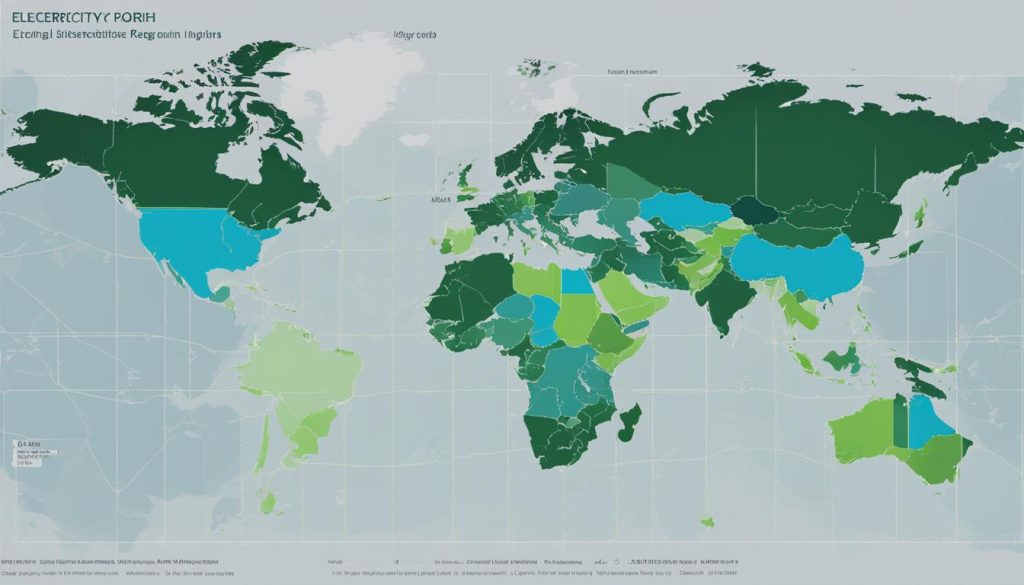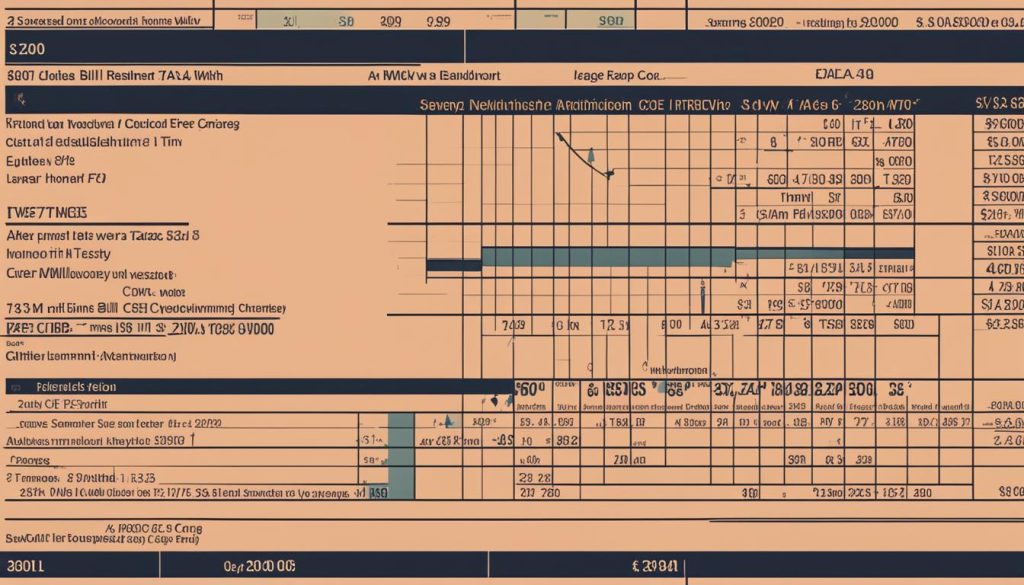UK Electricity Price per kWh – Current Rates
As electricity is an essential part of modern life, many people are interested in the cost of electricity. In the UK, electricity prices vary from place to place and depend on various factors.
Residential and commercial consumers alike need to have a clear understanding of electricity prices to make informed decisions about their energy costs.
With that in mind, this article will provide an overview of the current rates for the cost of electricity per kWh in the UK, as well as key information on energy prices and factors that may affect them.
Key Takeaways
- Electricity rates in the UK vary from location to location and depend on various factors
- Understanding the cost of electricity per kWh is vital for informed decision-making
- Residential and commercial consumers can benefit from comparing energy prices to find the best deals
- There are many factors that impact energy prices, including energy source, distribution costs, and government policies
- Consumers can take steps to reduce their energy consumption and save money on their electricity bills
Understanding Electricity Tariffs and kWh Rates
In the UK, electricity tariffs and kWh rates form the basis of what every consumer pays for their energy usage. Understanding these factors is essential for getting the best deal and managing household or business expenses.
A tariff refers to the price charged for electricity usage, usually measured in pence per kWh. This price varies depending on the supplier and tariff type, as well as on factors such as time of day, location, and usage level.

KWh rates, or the price charged for every kilowatt-hour of energy used, are also an important part of understanding electricity costs. As with tariffs, the kWh rate varies depending on several factors, including the energy supplier, tariff type, level of usage, and payment method.
The Different Types of Tariffs
There are different types of tariffs available to consumers in the UK, each with its own advantages and disadvantages:
| Tariff Type | Description |
|---|---|
| Standard Variable Tariff | A tariff with no fixed duration or price, which can be changed by the supplier at any time. This is the default tariff offered by most suppliers, but it often comes with higher rates. |
| Fixed Rate Tariff | A tariff with a set price for a defined period, which can protect consumers against price rises. However, opting for this tariff may require a minimum contract length. |
| Prepayment Meter Tariff | A tariff where energy is paid in advance using a prepayment meter. This option may be suitable for those who need to monitor their energy usage or have difficulty paying bills. |
| Time of Use Tariff | A tariff where the cost of electricity usage varies depending on the time of day, typically with lower rates during off-peak hours. This may be a good option for those who can shift their energy usage to off-peak hours. |
Factors Affecting Electricity Rates
The cost of electricity per kWh and the tariffs available to consumers are influenced by several factors. These include:
- The wholesale cost of energy
- The supplier’s cost of distributing energy
- The government’s energy policies and taxes
- Renewable energy subsidies
- The level of competition in the market
- The consumer’s level of energy usage and payment method
In order to compare energy tariffs and find the best rates for their needs, consumers should consider these factors and shop around for the most competitive offers.
The Cost of Electricity: Residential and Commercial Comparison
As mentioned earlier, electricity prices vary depending on several factors, such as the type of consumer, usage patterns, and availability of competitive rates. Let’s take a closer look at the differences in residential and commercial energy prices.
Residential energy prices are typically higher than commercial rates per kWh because residential consumers use less electricity overall than commercial consumers, resulting in higher costs. However, residential consumers have more options to compare and find cheap electricity rates that suit their energy needs. On the other hand, commercial consumers usually have access to lower rates due to their higher usage, but have fewer options and less flexibility in choosing their energy supplier.
Comparing the overall electricity cost between residential and commercial consumers can be challenging due to the differences in usage patterns. To get a better understanding of the cost differences, we can compare the average cost per kWh for each user type.
Average Electricity Rates in the UK by User Type

| User Type | Average Cost per kWh |
|---|---|
| Residential | 16.75 pence |
| Commercial (Small Business) | 15.43 pence |
| Commercial (Large Business) | 13.71 pence |
As shown in the table above, the average cost per kWh for residential consumers is higher than that of commercial consumers. However, small businesses have slightly lower rates than residential consumers, and large businesses have the cheapest rates.
If you are looking for ways to save on your energy bills, finding cheap electricity rates is crucial. You can compare energy plans and suppliers online to find the best deals for your energy needs. Additionally, consider reducing your overall energy consumption by using energy-efficient appliances, turning off electronics when not in use, and investing in home insulation.
Conclusion
To sum up, understanding the cost of electricity per kWh and electricity rates is essential for all consumers in the UK. By knowing the factors that influence electricity prices and comparing available options, consumers can make informed decisions and potentially save money on their energy bills.
It is important to remember that there are different types of tariffs available for consumers, and it is worth investing time in researching to find the best deal. Residential and commercial consumers can also benefit from considering factors like usage patterns and availability of competitive rates.
In conclusion, by being proactive and informed about electricity tariffs and kWh rates, consumers in the UK can make more informed decisions and potentially save significant amounts of money on their energy bills.
FAQ
What is the current electricity price per kWh in the UK?
The current electricity price per kWh in the UK varies depending on several factors, such as the region, the energy supplier, and the type of tariff. On average, residential consumers can expect to pay around 14 pence per kWh, while commercial consumers might pay slightly less due to their higher energy consumption.
How are electricity rates determined in the UK?
Electricity rates in the UK are determined through a combination of factors, including wholesale energy costs, network charges, renewable energy subsidies, and government levies. Energy suppliers also factor in their operational costs and profit margins when setting electricity rates. These rates are regularly reviewed and adjusted to reflect market conditions and regulatory requirements.
What are different types of electricity tariffs available to UK consumers?
There are several types of electricity tariffs available to UK consumers, including standard variable tariffs, fixed-rate tariffs, time-of-use tariffs, and green tariffs. Standard variable tariffs are the default option and can fluctuate in line with wholesale energy prices. Fixed-rate tariffs offer a fixed price per kWh for a certain period, providing price stability. Time-of-use tariffs vary based on the time of day, offering different rates during peak and off-peak hours. Green tariffs ensure that the electricity supplied comes from renewable sources.
How can consumers compare and find the best electricity rates?
Consumers can compare electricity rates from different suppliers using online comparison websites or by directly contacting energy suppliers. By entering their postcode and current energy usage, consumers can access a range of tariffs and compare the total cost per kWh, standing charges, and any additional benefits or discounts. It is important to consider factors beyond the cost per kWh, such as customer service, billing options, and the supplier’s environmental initiatives, to make an informed decision.
Why do electricity prices vary between residential and commercial consumers?
Electricity prices vary between residential and commercial consumers due to their differing energy usage patterns and levels. Commercial consumers typically use larger amounts of electricity, resulting in economies of scale and lower rates. Additionally, commercial consumers often negotiate custom tariffs with energy suppliers based on their specific requirements and usage patterns. Residential consumers, on the other hand, tend to have more standardized tariffs available and may have less bargaining power.
How can I find cheap electricity rates for my home or business?
To find cheap electricity rates, consumers can compare offers from different suppliers and consider switching to a more competitive tariff. Additionally, reducing energy consumption through energy-efficient practices, such as using LED lighting, insulating the property, and optimizing heating and cooling systems, can help lower overall electricity costs. It’s also worth considering renewable energy tariffs or generating your own electricity through solar panels if feasible.




